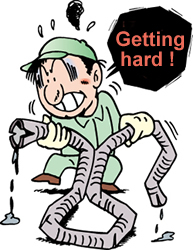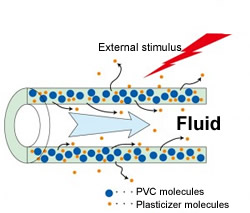Hose and Coupling Knowledge Base
If You Register to Become a Web Member, We Will Send You the Latest Information on Hoses and Coupling.
Why hoses get stiff

Q: Why do hoses get stiffer over time?
A: It is true that hoses, particularly those made out of vinyl chloride, can become stiffer with continued use. Vinyl chloride resin is ordinarily a hard material often used in pipes.
To make it soft for use in hoses and cable coverings, a plasticizer is introduced during the manufacturing process. No chemical reaction is involved. Instead, the plasticizer molecules situate themselves between the vinyl chloride molecules, providing a soft cushion for flexibility.
This graphic illustrates how external stimuli such as ultraviolet light and heat can cause the plasticizers to liquefy and move to the surface in a phenomenon known as plasticizer migration. When this occurs, the surface becomes sticky, a sign that the plasticizers inside the hose material are decreasing, which will lead to increased stiffness.

Archive
How to Cut Steel-Wire-Reinforced PVC Hose
Does Electricity Conservation Increase Condensation?
Why Do Hoses Leak & Disconnect?
Can PVC & Other Plastic Hoses Be Used for Fuel Gas & Kerosene?
How to Read Catalog Specifications, Part 4 – Are Hose Sizes Random?
How to Read Catalog Specifications, Part 3 – Minimum Bend Radius
Beware of Static Electricity on Hoses
How to Read Catalog Specifications, Part 2 – Negative Pressure+B10
About REACH, RoHS, Endocrine Disruptor & the Food Sanitation Act
How to Read Catalog Specifications, Part 1 – Use Pressure
How to Avoid Damage Caused by Ultraviolet Rays
The Dangers of Hose Condensation
Why Transparent Hoses Become Cloudy
Leaks & Disconnections Due to Mismatched Couplings & Hoses
Causes & Solutions for Leaks & Disconnections
The Benefits of the Right Hose for the Situation (2)









